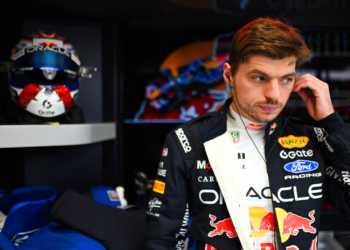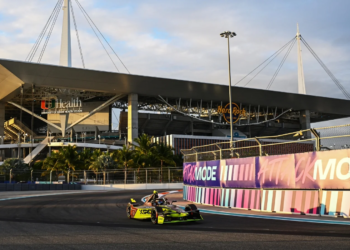Let me tell you a story. It is 1982. June. A Sunday. All are gathered on a grey and chilly day in Montreal at the inimitable Île Notre-Dame circuit, awaiting the latest Canadian Grand Prix. But they’ll be waiting a while. As the race isn’t scheduled to start until 4:15pm local time. Behest of TV.
In more than one sense it gets worse too, as there’s a big accident at the start and it claims the life of young Italian Riccardo Paletti. There is a red flag and a delay of two hours. Therefore the race finishes at something like 8pm local time. Which is now Monday for the ‘core European audience’ watching on.
The next race, three weeks later, is around the dunes of Zandvoort in the Netherlands. Arranged as a last minute replacement for a Spanish round at Jarama and therefore shoehorned in. It starts at 12:30pm, which is 11:30am in the UK. On a Saturday.
These weren’t one-offs either. To take one perennial, if you are of a certain vintage like me you’ll recall that each year the Monaco race, uniquely, wouldn’t get going until 3:30pm. Apparently so that Prince Rainier didn’t have to rush his lunch.
One wonders how the modern audience would cope with such nomadism. Not very well, on recent evidence.
Yes – Liberty, F1’s new(ish) and increasingly pariah commercial rights holder, has flown another kite. It thinks the race start time of your average European F1 round could be shifted back by 70 minutes. From the standard 2pm local time (and 1pm in Britain reflecting it’s an hour behind) to 3:10pm (and 2:10pm in Blighty).
As intimated the reaction to this suggested change has hardly been favourable. Some comments below the line are glorious in their melodrama, including that it is the death knell of F1 and they’re now going to walk and find something else to do with their leisure hours. Really of all the things that should be your tipping point…
Only Bernie Ecclestone’s steamrollering of all before him created the F1 championship as a coherent, homogenous block – and as part of it European races got the consistent green light time mentioned. Even Monegasque royalty couldn’t resist
In any case as with most F1 ‘norms’ the start time norm, as the examples at the outset indicate, is one in fact established fairly recently.
Only Bernie Ecclestone’s steamrollering of all before him created the F1 championship as a coherent, homogenous block that could be sold wholesale – and as part of it European races got the consistent green light time mentioned. Even Monegasque royalty couldn’t resist Bernie forever and come the late 1990s the Principality was brought into line.
I reserve judgement on the 3:10pm start and am interested to hear the rationale for it – we surely can at the very least give Liberty the credit to assume that it hasn’t pulled the new time out of thin air. To dismiss it before it’s even had its case stated, let alone been tested for real, simply is kneejerk. And – contrary to the impression given you might say – there is nothing magical about a 1pm/2pm Grand Prix start.
The later start time will at least aid those watching in the Americas where F1 fans currently have to rise at an ungodly hour to watch those rounds live – 8am on the US East coast and 5am on the West coast would became 9:10am and 6:10am respectively. Starting 10 minutes after the hour meanwhile is for the sake of commercial TV apparently, again particularly in America where they run adverts prior to the race start.
While in any case this represents an extension of what has been happening with start times anyway. Yes Bernie got his homogenisation, but over the past decade or so the pendulum has swung back. Fragmentation has been to the fore – night and dusk races now are fixtures on the calendar while flyaways such as those in Australia and Japan have had their starts shifted to late afternoon local time, again as it better suits international TV audiences.
We surely can at the very least give Liberty the credit to assume that it hasn’t pulled the new time out of thin air. To dismiss it before it’s even had its case stated simply is kneejerk. And there is nothing magical about a 1pm/2pm Grand Prix start
Moving around F1 sessions so they don’t clash with football matches in international tournaments is pretty routine. The French round is set to start later this year on those very grounds. We can add more peculiarly that last year’s US Grand Prix qualifying was pushed back by two hours to accommodate a Justin Timberlake concert.
It’s not at all peculiar to F1 either. Football is a classic example – not that long ago all matches in a league would kick off at the same time (3pm on a Saturday in the UK). Now they are routinely spread out all over a weekend, sometimes even happening on the Friday and Monday. Again as it’s in the commercial interest.
Speaking personally too the 1pm F1 race start has had its drawbacks. It’s plonked awkwardly in the middle of the day, and therefore watching it on TV can preclude doing much else with your Sunday. Your options are either to squeeze it in prior to 1pm (which in turn means setting your alarm which on a Sunday should be against the law) or starting it after 3pm. Options therefore are narrowed.
Such resistance to change however is becoming a habit it seems; parallels with the (over)reaction to F1 changing its logo at the end of last season spring to mind.
Pablo Elizalde spoke for a few when he asked if this recent news was the latest case of F1 “fixing another thing that wasn’t broken?” Plenty take the point a little further and question the apparent priorities: ‘why change x when you haven’t changed the more fundamental y and z (and a and b and c…)?’
This represents an extension of what has been happening with start times anyway. Over the past decade or so fragmentation has been to the fore – night and dusk races now are fixtures while flyaways such as those in Australia and Japan have had their starts shifted to late afternoon local time
Well there is the glaring point that it’s possible to think about more than one thing at the same time, plus just because something isn’t explicitly broken doesn’t mean there’s no case to refine it. At the very least it is hardly unreasonable to ask the question about when is best for all concerned for this bulk of races to start.
While about as glaring is that it’s not the work of a moment to change the said fundamentals that will improve the racing such as aerodynamic rules and financial distribution. Those are hornet’s nests. Even if you could wave a magic wand and get everyone to agree on them they still could not be changed at short notice. The Concorde Agreement ensures that for fundamental aero regs and for finances contracts run to the magic date of 2020.
“It is not something you just flick a switch and things happen,” noted commercial boss Sean Bratches late last year. Changing things like the start time – or logo – by contrast can be done at a snap of the fingers.
And whatever you think of Liberty it has made many pronouncements indicating it wants to change the aero and money distribution to improve the racing too. Will on Liberty’s part is not the issue.
In any case such furores tend to have a whizz-bang-and-they’re-out about them. Even the logo fuss appears to have died down. As Glenn Freeman tweeted within a fortnight of the Abu Dhabi launch, “realised this morning when I saw the app [with the new F1 logo] on my phone home screen – I’ve already got used to it.” The logo hardly gets mentioned now.
Likely it to some extent reflects the age. Social media storms, particularly in response to proposed change, are common (ask Leeds United). Protest has become not only immediate but requires little effort or sacrifice. The bar to entry is very low; close to non-existent. After all a Tweet, a click of a dislike button or online petition or whatever is under your nose can be done in a second.
To take us back to 1982, where we came in, if there were objections to the varying start times then about the only means of measuring it would have been seeing if it cropped up on the Autosport letters’ page a week or two afterwards. Protest therefore was slower – giving everyone time to take breath – and required more effort. I heard it argued recently that the things that get a social media furore these days likely back in the day would have got but a handful of letters.
Caution, even cynicism, are healthy. Not all ideas are good ones after all (see Liberty’s wheeze, since shot down, to have all 2018’s car launches on the same day). But even so it should not be at the expense of giving new ideas a hearing. Particularly about a series which clearly has so much room to improve. Perhaps it’s time that F1 folks opened their minds a little.







Discussion about this post